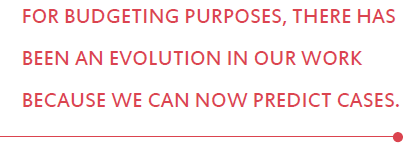Summary
Dantas discusses how his department is currently implementing legal tech solutions, after more than a decade of testing and trying the latest solutions.
After more than a decade focused on the chemical and pharmaceutical business while working for Bayer, formerly as a tax lawyer and overseeing all the legal areas over the years, I have recently decided to take on an opportunity that has changed my daily routine by moving to General Mills to be part of a great team, working now in the food business. I am now responsible for providing the direction for all legal and compliance matters across our company's businesses in Latin America. In order to do that, I have a team of six people within the region, and we are now deeply discussing, testing and making a lot of use of technology at General Mills. We are still evaluating tools for litigation - and with my previous experience as head of litigation at Bayer, for me, it is something the company can really make benefit of by having the right data and cost control while using this kind of technology. Nowadays, there is no way you can manage a legal department without making use of technology - and this is for contract, litigation and billing purposes - there is no way you can stay out of it. I am a big believer in technology, and I always try to foster this new technology right at its foundation. So as a business, we are, right now, testing and always looking for new technology, and hopefully we will get it implemented.
In the last three years, the legal sector has offered more in terms of developing technology, and is making real progress. Before that happened, I would say that it was a little behind. I think the legal market is going to keep up this technological momentum, but when compared to other markets, such as finance, we are still behind. I am a big believer that technology helps to streamline and illuminate company overheads. Legal professionals should take technology as part of their job: there is no way you can work in legal [or any other area] without taking technology as part of your job. It will become more and more relevant. You cannot stay away. You have to be prepared. There is no way you can manage a legal department without making use of technology.
For contract management, the use of technology has been helping companies here in Latin America a lot. We have an in-house system for contact management where you can easily pull out a predetermined contract, which dramatically reduces your overhead of in-house lawyers working on standard contracts. This is very helpful in terms of budgeting and overhead production. You are also able to control the workflow within the company: from the start of the contract, when the business unit is negotiating the contract, to the signing of this contact - which goes electronically and by hand. We are also implementing digital signatures for contracts.
For litigation, there has been a lot of upgrading within the systems available in the market - software companies are designing litigation tools: it works both in case management, and in billing. Therefore, you can manage the case and also have your external information managed within the system. This is helpful in
both reducing your overhead externally and controlling your case. In the past, companies were used to receiving reports by copying and pasting information into a system. But now we are finding that external law firms are inputting every piece of information on the case, rather than having in-house counsel do this. This technology is making the work of in-house counsel easier.
For budgeting purposes, there has been an evolution in our work because we can now predict cases. You can build your budget on the actual number of cases you have ongoing.

You are also able to control the hourly case rate on a case-by-case basis. This brings about more security and predictability on the existing provisions you may have.
I have been implementing new technology within my legal team for a while. It has been more than 12 or 13 years since I began upgrading systems and providing new technology to my team. Like I said, I am a big believer in technology. However, there are two big challenges you face when implementing new technology.
Firstly, the in-house team must be ready to make the change – it demands a lot of work, especially in terms of preparing for change. This requires a lot of work in standardising the documents and the archives for a new system first. You must make sure you are communicating the benefits of such technology to your team, in order to get everyone involved and committed to the project. This is a major internal challenge that you and your in-house team may face.
The second challenge concerns external counsel: when you are outsourcing your services to a large number of outside counsels, it is natural that each and every law firm uses their own system and has their own routine. It is difficult to make sure that the external company is using your system or actually providing the information that your company requires. So, when looking into systems, or any new technology, it's always highly recommended to integrate as much as possible the targeted solution with the existing technology available so no disruption is caused to your routine.
In my view, AI is going to disrupt the legal profession. In the past, people used to instruct lawyers for basic and simple cases. We had to answer the phone multiple times a day to address standard topics and answer these questions. But now, people are able to interact with a machine where their questions are answered and standard contracts are drafted, which saves companies a lot in terms of in-house counsel overhead needs. I think this is something that is already a reality and it will change dramatically the way we interact with our business. AI is our reality if we wish to develop a more standard and simplified way of building documents and contracts for legal work. This is already a reality and something that I would be happy to have the chance to be implementing within the next five years.
Will I lose my job to a computer in the future? This is a question that all lawyers are asking themselves. But, when it comes to views and interpretation of all nuances concerning either contracts or litigation, I still believe a machine will not be able to do this work. A human will always be required to do the job. Although, I do think for less complex things like mass litigation and standard contracts, I have no doubt that these are going to be performed by machines and may pose a threat to people currently performing these jobs. But, for high profile and specific cases, I still firmly believe there is no way a machine will be able to perform these in the same way a human can.
I think there is one topic regarding the use of technology of which I am a little sceptical and that is the predictive ability of software. By the time we receive a new lawsuit, there might be a high chance that the software will say that we are losing the case based on the current position of the court or the current position of the work in your country. The big challenge yet to be overcome is, again, the nuances of a number of court decisions we have and the way a machine interprets and provides its provision. There are a number of cases still decided and won by means of small details and it might be challenging for a machine to process such information in the same way that humans are able to. So, this is one area regarding the use of technology that I view as there still being more proof required.
So overall, I am fully supportive, and I feel the majority of the technology available has been fully proven. I am a big believer that they have come to help and streamline and eliminate the overhead




